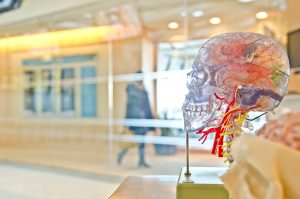 For quite some time now, UC San Diego has been a “widely acclaimed hub for neuroscience exploration,” according to a recent article in the San Diego Union-Tribune. The university “consistently ranks in the top tier of graduate neuroscience and neurobiology programs in the United States and nationally.” Now, with a donation from the Junior Seau Foundation, traumatic brain injury (TBI) research will expand dramatically at UC San Diego, with a specific focus on sports-related concussions and chronic traumatic encephalopathy (CTE).
For quite some time now, UC San Diego has been a “widely acclaimed hub for neuroscience exploration,” according to a recent article in the San Diego Union-Tribune. The university “consistently ranks in the top tier of graduate neuroscience and neurobiology programs in the United States and nationally.” Now, with a donation from the Junior Seau Foundation, traumatic brain injury (TBI) research will expand dramatically at UC San Diego, with a specific focus on sports-related concussions and chronic traumatic encephalopathy (CTE).
The Junior Seau Foundation was formed back in 1992 by the NFL linebacker who played for the San Diego Chargers from 1990-2002. Seau died as a result of suicide in 2012, and researchers determined that he had been suffering from CTE at the time of his death. How will the donation expand brain injury research at UC San Diego and help to prevent deaths like Seau’s?
Additional Donors Will Match Donation and Will Endow a Faculty Fellowship
The primary way in which the donation from the Junior Seau Foundation will allow the university to expand upon its research is by bringing additional donations to brain injury research at UC San Diego. This will happen in two different ways. First, three separate organizations that are currently “under the UC San Diego umbrella” have agreed to match the $250,000 contribution that came from the Foundation. As such, the university will have about $1 million to explore new opportunities concerning concussions and other traumatic brain injuries.
What will those opportunities look like? First, some of the money will be spent on an endowed faculty fellowship. In addition, the money will be used “to launch the Junior Seau Lectureship Series, which will bring selected K-12 students to campus once a year for presentations on the causes and risks of traumatic brain injuries.” As the article notes, CTE is a degenerative disease of the brain that is diagnosed postmortem by a buildup of protein in the brain. Researchers emphasize that CTE results from “repeated blows to the head,” and more specifically from sports-related concussions. It has numerous symptoms, according to the article, that include but are not limited to:
- Headaches;
- Erratic behavior;
- Memory loss; and
- Social instability.
These symptoms get worse over time.
Raising Awareness About CTE Among Youth Athletes from an Early Age
Given the link between CTE and multiple concussions, it is important for young athletes to know about the dangers of TBIs. The fact that a portion of the Junior Seau Foundation donation will be spent on educating youth athletes may help to reduce the rate of concussions on the field, and ultimately to reduce the number of athletes who develop CTE as a result of multiple blows to the head during their amateur and professional football careers.
Creating an endowed chair position will also allow UC San Diego to continue raising awareness about the connection between CTE and sports-related concussions. According to the article, “having an endowed chair provides the leverage to really stick to a topic and really dig their heels in.” The Junior Seau Endowed Faculty Fellowship in Traumatic Brain Injury, along with the lecture series, will enable the university to engage in community outreach efforts that could make a difference, a news release from UC San Diego Division of Biological Sciences highlights.
Contact a San Diego Brain Injury Attorney
If someone you love sustained a traumatic brain injury, you may be able to file a claim for compensation. An experienced brain injury lawyer in San Diego can assist you. Contact the Walton Law Firm today to discuss your case.
See Related Blog Posts:
Football in California May Irreparably Alter Kids’ Brains
Youth Football Helmets Recalled Due to Injury Risk
(image courtesy of Jesse Orrico)
 North County San Diego Injury Lawyers
North County San Diego Injury Lawyers








